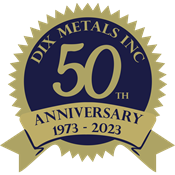Blanks, Blanks, And More Blanks!
Dix Metals Specializes In Supplying Precision, Machine-Ready Blanks Nationwide.
by C. H. Bush, editor; photos by John Semonish, staff photographer
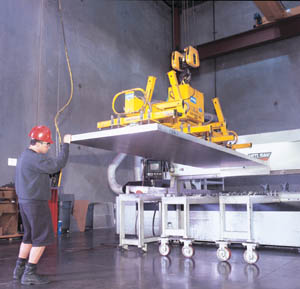 Huntington Beach, CA’s Dix Metals provides local and national metalworking customers with precision, aluminum, steel and other metal blanks.
Huntington Beach, CA’s Dix Metals provides local and national metalworking customers with precision, aluminum, steel and other metal blanks.
Founded in 1972 by Bob Dix and his wife, Bonnie, the company has grown steadily over the years through total specialization in providing blanks. The company currently has 55 employees and occupies a 110,000 sq ft facility fully equipped to meet its customers’ requirements.
In keeping with our effort to provide our readers with profiles of potential resources we recently visited Dix Metals for an interview with its founder, Bob Dix. The results of that interview are presented here for your review.
C. H. Bush, editor
CNC West: Bob, I was a little surprised when I heard that your company specializes in providing precision blanks without any other secondary machining services offered. Is there a reason for such a narrow specialty?
Dix: Yes, of course. For one thing our customers are machine shops and manufacturers. We’re in business to provide them with precision, machine-ready blanks, not to compete with them as a machining job shop. Also, we’ve been able to grow steadily over the years without branching out. To give you an idea of what I mean, we’ve added one new customer a day to our books for the past three years. We now have about 2800 customers we supply with precision blanks and about 25% of our business is outside the State of California. For us the bottom line is we give them machine-ready blanks and they do the rest.
Machine-Ready Blanks
CNC West: You call your blanks ‘machine-ready.’ How is that different from, say, pre-machined blanks?
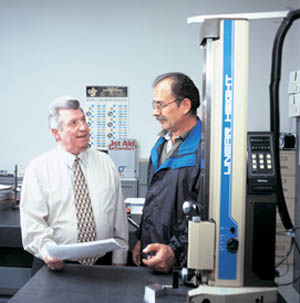 Dix: Well, it’s probably just two different ways to describe the same thing, except we limit the kinds of machining we do to the blanks. At Dix Metals we think the term machine-ready is more descriptive of what we do. The only machining we do is to prepare our blanks to make them ready for our customers to do their own machining. Therefore, we call them machine-ready blanks.
Dix: Well, it’s probably just two different ways to describe the same thing, except we limit the kinds of machining we do to the blanks. At Dix Metals we think the term machine-ready is more descriptive of what we do. The only machining we do is to prepare our blanks to make them ready for our customers to do their own machining. Therefore, we call them machine-ready blanks.
CNC West: Okay, got it. But, if you don’t do any secondary operations, what exactly do you do to create a machine-ready blank?
Dix: Basically, what we do is square the part. We can remove material from six sides of a part and consistently achieve flatness and parallel tolerances to .001” and surface finishes to 16Ra. On the other hand, we also can give customers simple rough blanks cut to size. It just depends on their needs.
CNC West: But why would they pay you to flatten and finish their blanks? Don’t your customers have the ability to machine their own blanks?
Dix: Sure, most of them do. But it’s really simple economics, Chuck. Over the years we have invested in some heavy-duty, specialized equipment that our customers don’t have. As a result, they really can’t do what we do to the blanks as economically as we can. For most customers it makes dollars and sense to use our equipment for these really specialized processes. Also, if you realize how long it would tie up their equipment to achieve the kinds of flatness and finish we give them, you can quickly see it’s more economical to have us do it.
CNC West: Yes, I can see that. But what about materials and quantities and part sizes? Are you limited in any way in what you can deliver?
Dix: Not really. The way we like to describe our size range is to say we can provide blanks in sizes ranging from parts small enough to hold a handful to parts so big two men can barely lift them. As far as materials, we have a huge inventory of aluminum, but in fact we can provide our customers with virtually any kinds of blanks they need, whether it’s steel, stainless steel, Inconnel, Titanium, brass, plastic, you name it. We supply a full range of materials.
Specialized Equipment
CNC West: Seeing that kind of size range and material capability makes me want to go back and ask about your equipment. You said you have some very specialized machines that your customers probably don’t have. What kinds of equipment are you talking about?
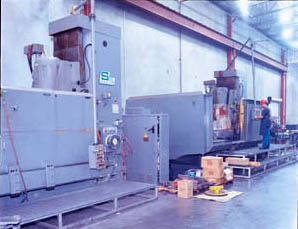 Dix: Well, for starters, we have seven state-of-the-art precision CNC plate saws. To my knowledge that may be the largest number of such saws under one roof in Southern California. These machines can cut plate up to 12 inches thick, 12 feet wide and 12 feet deep and they can hold tolerances to five thousandths.
Dix: Well, for starters, we have seven state-of-the-art precision CNC plate saws. To my knowledge that may be the largest number of such saws under one roof in Southern California. These machines can cut plate up to 12 inches thick, 12 feet wide and 12 feet deep and they can hold tolerances to five thousandths.
CNC West: I see. I think I also saw Blanchard grinders mentioned on your web site.
Dix: Yes. We have two really large rotary disk grinders, or Blanchard grinders as they’re also known, and we have three smaller Blanchards. The big machines are 200 horsepower with 84” chucks. As far as specialized equipment, we also have five double-disk grinders that go up to 42 inches in diameter, plus we have ten duplex mills, five CNC and five manual. Those machines run pretty much two shifts a day. As you can see, none of this is equipment our customers would normally have in their own shops.
CNC West: Some of this equipment looks pretty old.
Dix: Well, looks can be deceiving, Chuck. Take our twin mills, for example. We’ve had this equipment overhauled and updated with the latest CNC controls. Those machines were primarily designed for the automotive industry back in the 70's and 80's and you can’t buy them anymore. So what we did was convert these machines into very close tolerance, all CNC, state-of-the-art equipment. We tore them down to the bare castings and had them rebuilt from scratch. As a result, they’re really unique.
CNC West: Understood. But looking at the huge investment you have, it just struck me that you can’t afford to make mistakes when you get an order. I mean, suppose a customer orders a lot of half-inch parts squared to within .001” or something and you make a mistake and ship the wrong thing. That could cost a small fortune, couldn’t it?
Dix: Yes, you’re right, but we don’t let that happen. We have procedures in place to prevent it.
Quality Assurance
CNC West: Maybe you should tell us something about that. I’m sure potential customers will want to know how you handle quality control and what kinds of QC services you offer.
Dix: Sure, glad to. First, maybe I should say we serve a lot of industries that require really stringent quality control measures. Industries like semiconductor, automotive, and pharmaceutical manufacturing. As a result, we have committed to a philosophy of continuous improvement. We offer our customers SPC services, plus, if they require it, we can provide full traceability right back to the original metal manufacturer’s batch. We use a company in Canada called Traceability and they give us instant retrieval of data. Of course, we use a lot of different methods to check our work before we ship product, but frankly, quality control starts before we even get the order.
Order Desk Quality Control
CNC West: Would you mind explaining that?
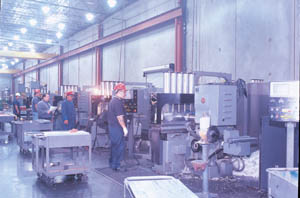 Dix: Not at all. What I mean is that if a customers gives us the wrong order or we misunderstand the order, there’s a good chance we’ll ship the wrong parts. For that reason our inside sales people go to a lot of trouble to be sure both they and our customers agree on exactly what is being ordered. Our people ask a lot of questions to be sure we have it right and sometimes we find that a purchasing agent may not know the answer. At that point we may fax our questions to the customer and ask them to come back to us with the answers we need. Once we have a clear understanding of an order we ask our customers to sign off on an authorization form.
Dix: Not at all. What I mean is that if a customers gives us the wrong order or we misunderstand the order, there’s a good chance we’ll ship the wrong parts. For that reason our inside sales people go to a lot of trouble to be sure both they and our customers agree on exactly what is being ordered. Our people ask a lot of questions to be sure we have it right and sometimes we find that a purchasing agent may not know the answer. At that point we may fax our questions to the customer and ask them to come back to us with the answers we need. Once we have a clear understanding of an order we ask our customers to sign off on an authorization form.
CNC West: Does that ever make them angry?
Dix: Maybe in the beginning, but most people think its a great way to assure they get exactly what they need.
CNC West: You have a modern new facility, 55 employees and 2800 customers. You must be doing something right, Bob. Thanks for the interview.
Dix: My pleasure.




